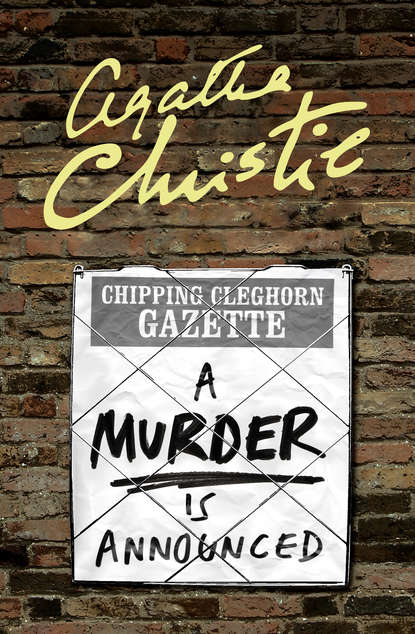По всем вопросам обращайтесь на: info@litportal.ru
(©) 2003-2024.
✖
A Murder is Announced
Автор
Год написания книги
2019
Настройки чтения
Размер шрифта
Высота строк
Поля
She said sharply:
‘Don’t, Dora. You know I asked you—’
‘Oh,’ Miss Bunner looked guilty. ‘I know. I forgot. But—but you are, aren’t you?’
‘Worried? No. At least,’ she added truthfully, ‘not exactly. You mean about that silly notice in the Gazette?’
‘Yes—even if it’s a joke, it seems to me it’s a—a spiteful sort of joke.’
‘Spiteful?’
‘Yes. It seems to me there’s spite there somewhere. I mean—it’s not a nice kind of joke.’
Miss Blacklock looked at her friend. The mild eyes, the long obstinate mouth, the slightly upturned nose. Poor Dora, so maddening, so muddle-headed, so devoted and such a problem. A dear fussy old idiot and yet, in a queer way, with an instinctive sense of values.
‘I think you’re right, Dora,’ said Miss Blacklock. ‘It’s not a nice joke.’
‘I don’t like it at all,’ said Dora Bunner with unsuspected vigour. ‘It frightens me.’ She added, suddenly: ‘And it frightens you, Letitia.’
‘Nonsense,’ said Miss Blacklock with spirit.
‘It’s dangerous. I’m sure it is. Like those people who send you bombs done up in parcels.’
‘My dear, it’s just some silly idiot trying to be funny.’
‘But it isn’t funny.’
It wasn’t really very funny … Miss Blacklock’s face betrayed her thoughts, and Dora cried triumphantly, ‘You see. You think so, too!’
‘But Dora, my dear—’
She broke off. Through the door there surged a tempestuous young woman with a well-developed bosom heaving under a tight jersey. She had on a dirndl skirt of a bright colour and had greasy dark plaits wound round and round her head. Her eyes were dark and flashing.
She said gustily:
‘I can speak to you, yes, please, no?’
Miss Blacklock sighed.
‘Of course, Mitzi, what is it?’
Sometimes she thought it would be preferable to do the entire work of the house as well as the cooking rather than be bothered with the eternal nerve storms of her refugee ‘lady help’.
‘I tell you at once—it is in order, I hope? I give you my notices and I go—I go at once!’
‘For what reason? Has somebody upset you?’
‘Yes, I am upset,’ said Mitzi dramatically. ‘I do not wish to die! Already in Europe I escape. My family they all die—they are all killed—my mother, my little brother, my so sweet little niece—all, all they are killed. But me I run away—I hide. I get to England. I work. I do work that never—never would I do in my own country—I—’
‘I know all that,’ said Miss Blacklock crisply. It was, indeed, a constant refrain on Mitzi’s lips. ‘But why do you want to leave now?’
‘Because again they come to kill me!’
‘Who do?’
‘My enemies. The Nazis! Or perhaps this time it is the Bolsheviks. They find out I am here. They come to kill me. I have read it—yes—it is in the newspaper!’
‘Oh, you mean in the Gazette?’
‘Here, it is written here.’ Mitzi produced the Gazette from where she had been holding it behind her back. ‘See—here it says a murder. At Little Paddocks. That is here, is it not? This evening at 6.30. Ah! I do not wait to be murdered—no.’
‘But why should this apply to you? It’s—we think it is a joke.’
‘A joke? It is not a joke to murder someone.’
‘No, of course not. But my dear child, if anyone wanted to murder you, they wouldn’t advertise the fact in the paper, would they?’
‘You do not think they would?’ Mitzi seemed a little shaken. ‘You think, perhaps, they do not mean to murder anyone at all? Perhaps it is you they mean to murder, Miss Blacklock.’
‘I certainly can’t believe anyone wants to murder me,’ said Miss Blacklock lightly. ‘And really, Mitzi, I don’t see why anyone should want to murder you. After all, why should they?’
‘Because they are bad peoples … Very bad peoples. I tell you, my mother, my little brother, my so sweet niece …’
‘Yes, yes.’ Miss Blacklock stemmed the flow, adroitly. ‘But I cannot really believe anyone wants to murder you, Mitzi. Of course, if you want to go off like this at a moment’s notice, I can’t possibly stop you. But I think you will be very silly if you do.’
She added firmly, as Mitzi looked doubtful:
‘We’ll have that beef the butcher sent stewed for lunch. It looks very tough.’
‘I make you a goulash, a special goulash.’
‘If you prefer to call it that, certainly. And perhaps you could use up that rather hard bit of cheese in making some cheese straws. I think some people may come in this evening for drinks.’
‘This evening? What do you mean, this evening?’
‘At half-past six.’
‘But that is the time in the paper? Who should come then? Why should they come?’
‘They’re coming to the funeral,’ said Miss Blacklock with a twinkle. ‘That’ll do now, Mitzi. I’m busy. Shut the door after you,’ she added firmly.
‘And that’s settled her for the moment,’ she said as the door closed behind a puzzled-looking Mitzi.
‘You are so efficient, Letty,’ said Miss Bunner admiringly.
CHAPTER 3 (#ulink_c305d9bb-d3c5-5b4d-b171-7a28eaf5b60e)
At 6.30 p.m. (#ulink_c305d9bb-d3c5-5b4d-b171-7a28eaf5b60e)

















